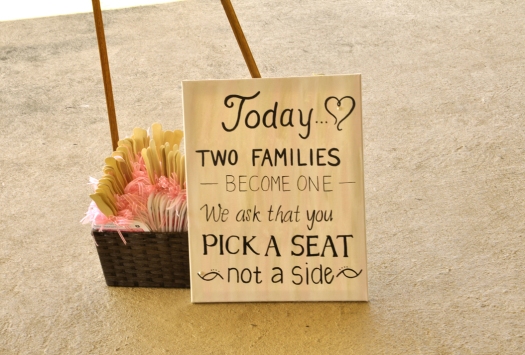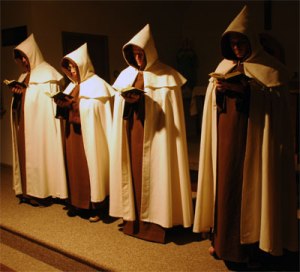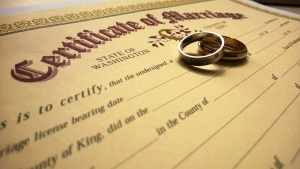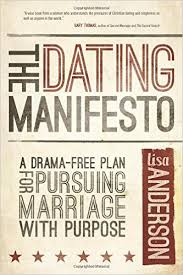
I have written about discerning the call to the charism of virginity (celibacy) on my blog before. Here I will try to add some new things to consider. Even though I use the word celibacy, I am addressing those who are virgins, both men and women, exclusively. I’m not talking about a period of time of not having sex or even someone choosing celibacy after having a sexual relationship. It’s just that celibacy is the word you’ll have more luck with when you research this subject. So if you read this post from the perspective of someone who has had a sexual relationship, looking for discernment, whether or not you should get remarried, etc., you will probably be lost. I happen to think it’s way past time for virginity to be given a little exclusivity. The biggest challenge when talking about discernment from a Protestant perspective is that it is a rare calling and so little is known. I usually have no idea how many people read my blog or what anybody thinks about it. I just try to picture an imaginary audience and go from there. So, how does one discern the call to celibate life? We first have to come to grips with the fact that Protestant churches, even the one you may be attending, have gotten it wrong since the Protestant Reformation some 500 years ago. So don’t expect things to change overnight.
One of the things you will definitely need is a rebellious spirit. I’m not talking about taking up arms against a rogue government or drag racing behind the liquor store. I’m talking about saying no to the idol of family worship and all the comforts and conveniences society has bestowed upon them; saying no to sex worship, mother and child worship, and all the materialism and comforts we associate with the American dream. We have to be okay with not having children to pass inheritances to. We don’t have to hate women and children, but we have to be able to prioritize their status when comparing them to eternity. So if the current status quo of “family church” makes you uncomfortable, don’t rule out celibacy just yet. Don’t rule out the chance to help bring the value of married life and celibate life more into balance. After time, you will be the one making families take a second look at their priorities. Yes, it is a rebellious lifestyle.
We also have to be able to say no to ourselves and any plans for nuptial bliss, while saying yes to a closer walk with God and serving as witnesses of the world to come. That means we have to look at our motivations very closely. If you’re in college, are you looking for a spouse? A choice for celibacy should not be made based on the notion that the opposite sex don’t find you attractive, that you can’t get a date, or that men don’t ask you out. It should be based on the realization that there are some things in the world more important than sex. It’s one thing to hear somebody say that. It’s quite another thing to live it out. When I was in college, I jokingly told people that I had so many girlfriends I couldn’t make up my mind about which one to marry. And I think that’s actually a good way to look at the call to celibate life. God has allowed us to have hearts that have enough love for more than one person or one family.
Timing. We are invariably comparing the timing of a wedding to the timing of . . . something that doesn’t even have a name in Protestant circles. The New Testament has only one mention of a wedding in Matthew 22, the marriage at Cana, where Jesus turned the water to wine. Nothing is said about the timing of the wedding or even the ceremony. What we have made of marriage today is exactly that – It’s manmade. All of the hoopla that we associate with weddings, including church ceremonies, bridesmaids, vows, dresses, cakes, marriage licenses, rings, is the product of manmade tradition. None of it is mentioned in the Bible. Does that make marriage or weddings wrong? Here’s how I answer that: Not necessarily. But to the extent marriages are undertaken with no regard for celibacy, with not even a fleeting thought given to a life with Christ, they are worse than the unfaithfulness and divorces to which most of them lead. I know that Catholic tradition is all we have to go on, but I don’t think celibate vows or ceremonies are necessary. So instead of timing a ceremony, I think it’s appropriate that we begin to tell our close friends and family of the decision we have made to remain as we are and devote our lives to other worthwhile (eternal) causes. And I think it would be okay to do that when you know you’ll never love a spouse more than you love the people you are forgoing marriage for. So it’s not about us having more free time to do God’s work. We actually have less time, because there is no free time doing his work.
It helps to understand celibacy’s role in relation to marriage. This is a big one and the one that took the most time for me. Of course, the biggest challenge is that we live in a married world. Celibacy has to be looked at with at least as much honor, value, and respect as marriage and family. If you know of a godly family, you can learn a lot by watching them in public with their kids. Watch their interactions, not only amongst themselves, but also with other people. There is a certain grace and dignity that comes with being comfortable in your own shoes. Watch a husband jump into action to protect his wife or children from harm. It’s like an inborn instinct. He doesn’t have to stop and think about it. He acts. Whether it’s pulling them out of the way of oncoming traffic or shielding their eyes from sexually explicit images, the drive to protect his family comes very natural. The same thing is true of mothers. So it is with a person called to celibate life. We are not saying no to paternal or maternal instincts. Rather, by sacrificing much more than is possible in marriage, we are taking them to a higher level. We ought to care just as much about marginalized people as a father cares about his family. Our hearts should be ready to respond in a heartbeat. If you feel that tug, a tug beyond passive empathy, then celibacy may be right for you. I’m not necessarily talking about being a missionary in a third world country. There are lots of needs all over the U.S.A. Needs that can only be met with the passion of a celibate person. Unfortunately, all that we’re likely to hear about virginity in Protestant churches is from the standpoint of true love waits on a spouse. It’s most likely to come from a very comfortable and frumpy married white preacher dude who depends on the tithes and offerings collected in church to take care of him and his family. So as far as discussing anything besides family life, he has a conflict of interest the moment he opens his mouth. I’ve heard many preachers claim that they can relate to the gift of singleness because “I was once single before I met my wife.” That is simply not true. Waiting on marriage as a single person and waiting on the return of Christ as a person with the gift of celibacy are not even in the same hemisphere. As far as someone in the Protestant church having insight into celibacy, the only exception may be a preacher who lived a chaste life into his 30’s-40’s before he got married. Then he might have a hint. So we have to be willing to educate, tactfully.
We have to understand celibacy in relation to society. One very common notion that is passed around when people talk about celibacy is that it frees us to do “greater service.” Well, okay. But that’s about as informative as saying the sky is blue. If all we understand about celibacy is that is frees up our time to do greater service to help greater numbers of people, we have missed the mark. We have become nothing more than a refried preacher. First, from a spiritual standpoint, we have to accept that celibacy itself is a higher calling than marriage. That doesn’t mean we are better than married people. It means that we have more responsibility, are better qualified to represent the love of God, and have a straighter path to heaven. If we just see celibacy as freeing up time, then it could very well become a means to an end. Our lives would be rated according to how much we did, how much we stayed busy, and how many people we served. We must see the gift of celibacy as something good in itself. Churches have to see it more than extended adolescence and a failure to “man up.” I’ve often wondered what families’ reactions to me would be if I treated them with the same suspiciousness and cynicism I see from them. “Well, congratulations on your 25th wedding anniversary Carl. How many women did you bang last year?” Or “Sorry to hear your wife has been dead 10 years. Have you found a homosexual lover yet?”
In discerning celibacy, we also must have our sexual desires under control and be content with living a life without sex. One word many Catholic authors use is sublimation, which just means that something is raised to a higher standard. For example, the short-term goal of sexual energy can be redirected to taking care of orphaned children in third world countries. The higher good has to be something we are passionate about and not just something to pass the time with until we figure out what we want to do. And we make the final call about what those other worthwhile causes are. There will always be people who will not see our long-term goals and higher values. It helps to have friends on the same journey to discuss these matters with. I think sexual desires tend to sublimate naturally as we get older, to a certain extent. When I’m with people I don’t know, I’m usually conscious about how I’m being perceived. It can be downright dangerous to be a single man in public today. I don’t want to come across as a monk in silent piety and prayer. But I don’t want to come across as a single man looking for a romantic partner either. Striking that balance is an ongoing challenge. Since I’m still the class clown, I’m always looking for ways to make people laugh. What I have found is that it only takes knowing a person is human to do that. I don’t need to know gender, age, marital status, race, or anything else society says is important. I have gotten to know several hermaphroditic/intersex-identified people through the years. It really is remarkable how people can relate to each other when cultural expectations are taken out of the picture. And it is even more remarkable how a small “hello” and recognition of another person’s existence can spark a conversation and a lifetime friendship. So if we are able to put aside our stereotypes and see all people as human beings in need of other people to relate to, God can take those desires and reshape them into passions and endeavors that far surpass romantic love.

















































You must be logged in to post a comment.